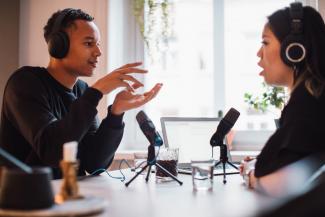
Do the preparation task first. Then listen to the audio and do the exercises.
Preparation
Transcript
Presenter: So, today's expert teacher is Gabriella, a university English teacher from Leeds. Gabriella, hi and thanks for joining us today.
Gabriella: Thanks for having me!
Presenter: So, I have to confess today's topic is something I am really bad at: listening. Most people say speaking is the most stressful part of learning a new language but, for me, with my B1 German, speaking isn't so bad. At least I'm in control of it. But listening … woah … people speak so fast and it's like my brain just shuts down. Am I just really strange and bad at listening? Tell me, honestly, I can take it.
Gabriella: No, you're not strange. In fact, it's really common. You know, in exams most people do pretty well in speaking compared with listening. Of course, exams are a different situation from real life because in an exam you can't ask for something to be repeated or explained. You usually have just one or maybe two opportunities to listen to the dialogue and then it's gone.
Presenter: Right, but in real life I feel stupid always saying, 'Sorry, can you repeat that, please?', especially if I still don't understand even when they repeat it. And people out there listening, I hope you don't do this – quite often the person just repeats what they said equally as fast and I'm still lost!
Gabriella: They do, don't they? In real life, you've got two strategies. One is to pretend to understand and get out of the conversation as fast as you can.
Presenter: Yep, sounds familiar!
Gabriella: But, obviously that's not going to help if it's a conversation with high stakes. It might have important consequences. I mean, if you're just chatting with a stranger at the bus stop, it doesn't matter. But imagine you're at a government office or a bank, trying to find out what paperwork you need to get your ID or open a bank account. What can you do then?
Presenter: I hope you've got the answer, Gabriella, because I'm coming out in a cold sweat just thinking about either of those situations!
Gabriella: The other strategy is to summarise what they said.
Presenter: But how can you do that if you didn't understand what they said?
Gabriella: Ah, well, you only start the summary, so you might say, in German in your case, 'OK, so the first thing I have to do is …?' and make it a question. Or, for example, 'And which office is that again?' Break it down into smaller questions and the other person will naturally start answering them. That way you're controlling the conversation a bit more.
Presenter: I get you ...




that's amazing
i am vietnamese person. when i was child, i dont focus on learning English. So my english is very terrible.
I'm a native spanish speaker, to improve my English listening skills had been pretty difficult but hadn't been impossible. I had practiced listening skills reading in loud voice (I love reading in English), listening popcast and some short coversations of native English speakers. Everyday I listen one song at least on youtube that I like, after that I browse its lyrics on google website and finally I sing that song with the lyrics on hand. I feel that I'm on way to improve my listening skill and I enjoy it! (Sorry if I have mistakes in this comment, I'm also learning how to write in English).
I am trying to develop my listening with doing exercises as much as i can. My listening exercises contain: this web sites listening exercises, podcasts, songs , videos etc.
my listening is also bad. And I`m trying to practise listening ebery day by chatting with native speakers, listening audios here and sometimes watching films and videos.
Keep it up, your on the right track. This is what I tell my students. Practice everyday.
Gabriella's strategy for managing important conversations sounds strange to the interviewer at first-True. I can't understand this one. Pls more explains everyone
Hello Huyenphamhr,
I'll copy the part of the transcript that is relevant here:
The presenter is surprised because she doesn't understand how it's possible to summarise something that you haven't understood.
Does that make sense?
All the best,
Kirk
LearnEnglish team
In my opinion, the best way to improve listening skills is to immerse yourself in English every day through various methods, such as listening to your favorite podcasts, watching movies, and listening to music. Try to mimic the sounds and intonation when you listen to native speakers. To avoid distractions during your learning time, prepare yourself in a quiet environment to deeply focus on your learning and increase your efficiency.
Agreed, this is what I tell my students all the time. Especially new onboarding students. I provide the example: In the U.S. we go to school everyday(Monday-Frieday) not once a week, 2 or 3 time a week. To learn we must practice everyday. Such is the life of a student.